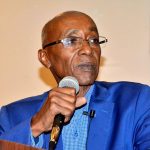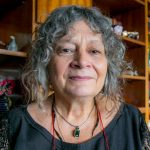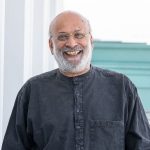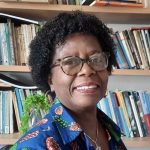Professor Jane Anna Gordon's conversation with Oxford's Public Philosophy on Creolizing theory is available on YouTube.
Author: Web Admin
Creolizing Rosa Luxemburg
Posted on by Web Admin
The paperback edition of Jane Professor Jane Anna Gordon's co-edited anthology on Creolizing Rosa Luxemburg is now available.
An Afro-Jewish Critique of Jews Against Liberation
Posted on by Web Admin
In the Reflections on Racism, Oppression, and Antisemitism series for the University of Notre Dame Keough School of Global Affairs' Contending Modernities blog, Professor Lewis Gordon critiques hegemonic readings of Jewish history and current events that focus exclusively on the concerns represented by Jews who have identified themselves with whiteness. He contend that a true Jewish theology of liberation is one that sides with those who are oppressed and against various forms of idolatry, including the prioritization of the state of Israel in his latest post.
Ngũgĩ wa Thiong’o: Decolonizing the American University
Posted on by Web Admin
Distinguished Professor Ngũgĩ wa Thiong’o at Yale University gives a lecture on Decolonizing the American University as part of the African Writers in Conversation Series at the Yale MacMillan Center Council on African Studies.
Professor Lewis Gordon speaks on “Freedom, Justice, and Decolonization”
Posted on by Web Admin
Lewis Gordon, of University of Connecticut, speaks on "Freedom, Justice, and Decolonization" for the African Studies Virtual Forum: Decoloniality and Southern Epistemologies series at Penn State.
The African Studies Virtual Forum 2020–2021 led by Dr. Sinfree Makoni seeks to decenter hegemonic epistemologies and to decolonize the Western canon to facilitate other ways/waves of knowing. Through a series of online conversations, participants in the Forum will challenge the notion of the “universal truth” and discuss how the only truth that is universal is the truth of complexity. To decolonize knowledge, epistemic perspectives need to be pluralistic in ontologies, cosmologies, and insights, and the emergence of Southern Epistemologies is one such response to the decolonial turn.
Joining from around the world, speakers will discuss the multiple approaches taken in the humanities and social science scholarship to decolonize knowledges by paying attention to complexities, heterogeneities, and multiple ontologies.
Press Release – The Caribbean Philosophical Association’s 2021 Award Winners
Posted on by Web Admin

The Caribbean Philosophical Association is pleased to announce the 2021 recipients of the association’s awards for contributions to philosophical thought, literature, and mentorship:
The Frantz Fanon Lifetime Achievement Award
Nicolás Cristóbal Guillén Batista Lifetime Achievement Award
Stuart Hall Outstanding Mentorship Award
Frantz Fanon Outstanding Book
Adom Getachew’s Worldmaking After Empire (Princeton University Press)
Nicolás Cristóbal Guillén Batista Outstanding Book Award
Chandramohan S., “Love After Babel” and Other Poems (Daraja Press)
***
The selection of awardees is made annually by the Caribbean Philosophical Association’s Awards Committee, which consists of all prior recipients of the Frantz Fanon, the Nicolás Guillén, and the Stuart Hall Awards and an appointed senior scholar and an appointed junior scholar. For more information, please consult:
- The Franz Fanon Award
- The Nicolas Cristóbal Guillén Batista Philosophical Literature Prize
- The Stuart Hall Award
The Award Ceremony will take place virtually this year because of the COVID-19 Pandemic. The ceremony will commemorate the 2021 and 2020 laureates because of the cancellation of the 2020 meeting. The date of the 2021 Award Ceremony will be posted on the Caribbean Philosophical Association’s website by March 15, 2021.
Each recipient is being acknowledged for the importance of their work for the Caribbean Philosophical Association’s ongoing project of shifting the geography of reason. In the words of 2014’s Guillén Lifetime Achievement Laureate Ngũgĩ wa Thiong'o:
[We] celebrate the new recipients of the awards; sisi kwa sisi, (we for us/for one another/from us to us) we used to say in Kiswahili.
The Frantz Fanon Lifetime Achievement Award
 |
Hussein Bulhan
Hussein Bulhan is the author of Fanon and the Psychology of Oppression. He founded clinics for treating Blacks and other communities of color in the United States and in his native country of Somalia, where he is the founder of the Frantz Fanon University. His TedX talk is available here. The Awards Committee celebrates Dr. Bulhan not only for the political and theoretical richness and importance of his writings but also because of the crucial role he has played over four decades as an institution-builder in education, communications, and clinical institutions. |
 |
Silvia Frederici Sylvia Frederici is a world-renown political theorist who formerly directed the Frantz Fanon Institute in Milan, Italy. This is the Wikipedia page on her. Her influential writings include Caliban and the Witch. The Brooklyn Institute for Social Research devoted an entire seminar to that work. The Awards Committee celebrates Professor Frederici for the political and theoretical richness of her writing and her political activism in Italy, Nigeria, the United States, and many other countries across the globe. |
 |
Rita Laura Segato
Rita Laura Segato is a world renown Argentinian-Brazilian anthropologist and bioethicist on feminism and Indigenous rights. Here is the Wikipedia page on her. Her accolades are many, as she reaches across generations and institutions ranging from academic to community centers. Her impact is across generations, as this forum in which she engages an audience of adolescents attests. The Awards Committee celebrates Professor Segato for her profound, transformative impact on the lives of those who are, in the words Enrique Dussel, the first Laureate of this award, “the underside of [Euro]modernity.” |
Nicolás Cristóbal Guillén Batista Lifetime Achievement Award
 |
Rozena Maart
Rozena Maart is a philosopher, poet, novelist, and longtime activist against antiracism and sexual violence and a champion for the flourishing of Africana thought in her native South Africa and other countries such as Canada, Colombia, the UK, the United States (especially through Philosophy Born of Struggle), and across the globe through the Caribbean Philosophical Association and other organizations such as the St. Croix Literary Festival. Here is a link to a lecture she gave at the University of Cape Town in 2020 before the pandemic lockdowns, and here is the Wikipedia page on her. The Award Committee celebrates Professor Maart for the philosophical, political, and literary richness of her writings and her contributions as an institution-builder in education and her work as a psychoanalyst and social worker. |
 |
Firoze Manji
Firoze Manji is a medical worker (dentistry) who has devoted his life to radical, liberatory politics through creating publishing outlets for writers across the Global South, in addition to writing books of his own and many articles as a journalist. He has also organized many multimedia forums presenting the work of intellectuals across the globe through a variety of organizations. All of this work has been done as he lived and worked not only in his native Kenya but also in Senegal, the UK, South Africa, and Canada, for organizations ranging from Amnesty Intellectual to CODESRIA and Tricontintal. Here is an interview with him from summer 2020, and here is the Wikipedia page on him. The Awards Committee celebrates Dr. Manji for his years of dedicated work, which includes the founding of Daraja Press, publications on intellectuals of struggle ranging from Amílcar Lopes da Costa Cabral to Walter Rodney, and his ongoing global activism building of global networks devoted to the cultivation of dignity, freedom, and liberation. |
Stuart Hall Outstanding Mentorship Award
 |
Florentina da Silva Souza
Dr. Florentina da Silva is Professor of Brazilian Literature at the Federal University of Bahia, Professor in the Graduate Program in Literature and Culture at ILUFBA and in the Postgraduate Program in Ethnic and African Studies (CEAO-UFBA). She is also the second vice president of the Brazilian Association of Black Researchers. A legendary mentor in Brazil, her students are among what the political scientist Evelyn Simien calls “historic firsts,” as they are among the first Black women to teach in their institutions in their areas of research. The letter of nomination, co-signed by several of her students, states: We would like to make it clear that [Professor da Silva Souza] is responsible for [generations of teachers] in Brazil and other countries, which makes a difference in the way they work in Basic Education and/or in Higher Education. . . . Without a doubt, Professor Florentina da Silva Souza, throughout her academic and intellectual trajectory, has built exemplarity and excellence in [her fields]. We are proud and grateful to have studied with her and regard her as our eternal. . . . |
Frantz Fanon Outstanding Book Award
 |
Adom Getachew, Worldmaking After Empire (Princeton University Press)
The author, Dr. Adom Getachew, is the Neubauer Family Assistant Professor of Political Science at the University of Chicago. This already award-winning book continues to receive journal reviews and has been the subject of various podcasts and conference panels. Among the book’s many virtues is the author’s argument that anti-colonial nationalists from the Caribbean and Africa—for example, Nkrumah, Williams, Manley, Nyerere, and others—reworked sovereignty/self-determination into an innovative project of worldmaking. |
Nicolás Cristóbal Guillén Batista Outstanding Book Award
 |
Chandramohan S., “Love After Babel” and Other Poems (Daraja Press)
Chandramohan S. is an Indian Dalit poet who is also a member of the P.K. Rosi foundation, a cultural collective, which is named after the great Dalit actress, devoted to the demarginalization of Dalit-Bahujans. According to three reviewers: Love after Babel is a brilliant new poetry collection by Dalit poet Chandramohan S, a highly charged political treatise. Chandramohan's position as a Dalit writer illuminates his treatment of caste-based oppression, while also creating a sense of radical solidarity between various marginalized identities in contemporary Indian society through his focus on other forms of oppression, namely on experiences of Islamophobia, gender based violence and racism. It is an active political tool to counter multiple forms of oppression in India and across the world. *** Chandramohan's poetry is an extraordinary combination of a strong individual voice, crying out against a deeply felt sense of personal abuse, and a sophisticated understanding of the long history and mythology of such abuse, in India but also in the world at large. The poems are by turns shocking, moving, and exhilarating. *** This is poetry—at its best. No wonder then that, his poems have been published worldwide. He is perhaps now one of the very few, if not the only Indian poet in English to have taken the burden of social and political repression, as a distinct and livid political idiom. To read his poems is also painful, but the poetry is in the pain! |
Scholars Reflect on the Symbolism of a Black-Jewish Senate Runoff Election Win in Georgia
Posted on by Web Admin
By Sara Weissman
"Georgia elected Jon Ossoff, its first Jewish senator, and Reverend Dr. Raphael Warnock, its first Black senator, in a suspenseful runoff election on Tuesday.
For scholars, Warnock and Ossoff’s joint Senate victory reflects a long, winding relationship between Black and Jewish communities in the United States, particularly in the context of Georgia’s political history."
Read more in Diverse Issues in Higher Education via this link.
Freedom, Justice, and Decolonization
Posted on by Web Admin
By Lewis R. Gordon
Copyright Year 2021
ISBN 9780367632465
Published December 31, 2020 by Routledge
158 Pages
Book Description
The eminent scholar Lewis R. Gordon offers a probing meditation on freedom, justice, and decolonization. What is there to be understood and done when it is evident that the search for justice, which dominates social and political philosophy of the North, is an insufficient approach for the achievements of dignity, freedom, liberation, and revolution? Gordon takes the reader on a journey as he interrogates a trail from colonized philosophy to re-imagining liberation and revolution to critical challenges raised by Afropessimism, theodicy, and looming catastrophe. He offers not forecast and foreclosure but instead an urgent call for dignifying and urgent acts of political commitment. Such movements take the form of examining what philosophy means in Africana philosophy, liberation in decolonial thought, and the decolonization of justice and normative life. Gordon issues a critique of the obstacles to cultivating emancipatory politics, challenging reductionist forms of thought that proffer harm and suffering as conditions of political appearance and the valorization of nonhuman being. He asserts instead emancipatory considerations for occluded forms of life and the irreplaceability of existence in the face of catastrophe and ruin, and he concludes, through a discussion with the Circassian philosopher and decolonial theorist, Madina Tlostanova, with the project of shifting the geography of reason.
Read more on the Publisher's Website.